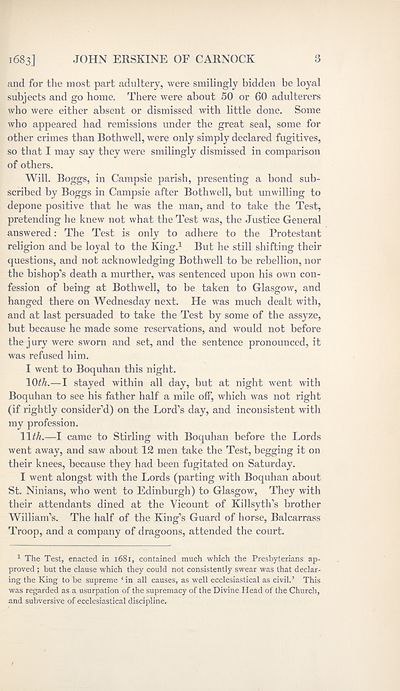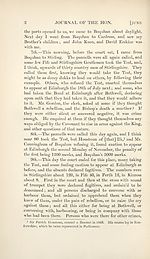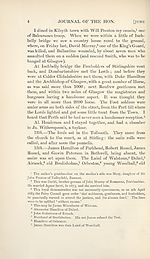Download files
Complete book:
Individual page:
Thumbnail gallery: Grid view | List view

JOHN ERSKINE OF CARNOCK
3
1683]
and for the most part adultery, were smilingly bidden be loyal
subjects and go home. There were about 50 or 60 adulterers
who were either absent or dismissed with little done. Some
who appeared had remissions under the great seal, some for
other crimes than Bothwell, were only simply declared fugitives,
so that I may say they were smilingly dismissed in comparison
of others.
Will. Boggs, in Campsie parish, presenting a bond sub¬
scribed by Boggs in Campsie after Bothwell, but unwilling to
depone positive that he was the man, and to take the Test,
pretending he knew not what the Test was, the Justice General
answered: The Test is only to adhere to the Protestant
religion and be loyal to the King.1 But he still shifting their
questions, and not acknowledging Bothwell to be rebellion, nor
the bishop’s death a murther, was sentenced upon his own con¬
fession of being at Bothwell, to be taken to Glasgow, and
hanged there on Wednesday next. He was much dealt with,
and at last persuaded to take the Test by some of the assyze,
but because he made some reservations, and would not before
the j ury were sworn and set, and the sentence pronounced, it
was refused him.
I went to Boquhan this night.
\tith.—I stayed within all day, but at night went with
Boquhan to see his father half a mile off, which was not right
(if lightly consider’d) on the Lord’s day, and inconsistent with
my profession.
Wth.—I came to Stirling with Boquhan before the Lords
went away, and saw about 12 men take the Test, begging it on
their knees, because they had been fugitated on Saturday.
I went alongst with the Lords (parting with Boquhan about
St. Ninians, who went to Edinburgh) to Glasgow, They with
their attendants dined at the Vicount of Killsyth’s brother
William’s. The half of the King’s Guard of horse, Balcarrass
Troop, and a company of dragoons, attended the court.
1 The Test, enacted in 1681, contained much which the Presbyterians ap¬
proved ; but the clause which they could not consistently swear was that declar¬
ing the King to be supreme ‘in all causes, as well ecclesiastical as civil.’ This
was regarded as a usurpation of the supremacy of the Divine Head of the Church,
and subversive of ecclesiastical discipline.
3
1683]
and for the most part adultery, were smilingly bidden be loyal
subjects and go home. There were about 50 or 60 adulterers
who were either absent or dismissed with little done. Some
who appeared had remissions under the great seal, some for
other crimes than Bothwell, were only simply declared fugitives,
so that I may say they were smilingly dismissed in comparison
of others.
Will. Boggs, in Campsie parish, presenting a bond sub¬
scribed by Boggs in Campsie after Bothwell, but unwilling to
depone positive that he was the man, and to take the Test,
pretending he knew not what the Test was, the Justice General
answered: The Test is only to adhere to the Protestant
religion and be loyal to the King.1 But he still shifting their
questions, and not acknowledging Bothwell to be rebellion, nor
the bishop’s death a murther, was sentenced upon his own con¬
fession of being at Bothwell, to be taken to Glasgow, and
hanged there on Wednesday next. He was much dealt with,
and at last persuaded to take the Test by some of the assyze,
but because he made some reservations, and would not before
the j ury were sworn and set, and the sentence pronounced, it
was refused him.
I went to Boquhan this night.
\tith.—I stayed within all day, but at night went with
Boquhan to see his father half a mile off, which was not right
(if lightly consider’d) on the Lord’s day, and inconsistent with
my profession.
Wth.—I came to Stirling with Boquhan before the Lords
went away, and saw about 12 men take the Test, begging it on
their knees, because they had been fugitated on Saturday.
I went alongst with the Lords (parting with Boquhan about
St. Ninians, who went to Edinburgh) to Glasgow, They with
their attendants dined at the Vicount of Killsyth’s brother
William’s. The half of the King’s Guard of horse, Balcarrass
Troop, and a company of dragoons, attended the court.
1 The Test, enacted in 1681, contained much which the Presbyterians ap¬
proved ; but the clause which they could not consistently swear was that declar¬
ing the King to be supreme ‘in all causes, as well ecclesiastical as civil.’ This
was regarded as a usurpation of the supremacy of the Divine Head of the Church,
and subversive of ecclesiastical discipline.
Set display mode to:
![]() Universal Viewer |
Universal Viewer | ![]() Mirador |
Large image | Transcription
Mirador |
Large image | Transcription
Images and transcriptions on this page, including medium image downloads, may be used under the Creative Commons Attribution 4.0 International Licence unless otherwise stated. ![]()
| Scottish History Society volumes > Series 1 > Journal of the Hon. John Erskine of Carnock, 1683-1687 > (58) Page 3 |
|---|
| Permanent URL | https://digital.nls.uk/127090017 |
|---|
| Attribution and copyright: |
|
|---|
| Description | Over 180 volumes, published by the Scottish History Society, containing original sources on Scotland's history and people. With a wide range of subjects, the books collectively cover all periods from the 12th to 20th centuries, and reflect changing trends in Scottish history. Sources are accompanied by scholarly interpretation, references and bibliographies. Volumes are usually published annually, and more digitised volumes will be added as they become available. |
|---|


